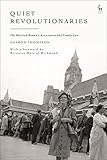Quiet Revolutionaries : The Married Women's Association and Family Law / Sharon Thomson
Material type: TextPublication details: Oxford, UK; New York, USA Hart Publishing an Imprint of Bloomsbury Publishing 2022Edition: First EdDescription: xv, 264p. : ill. ; 24cmISBN:
TextPublication details: Oxford, UK; New York, USA Hart Publishing an Imprint of Bloomsbury Publishing 2022Edition: First EdDescription: xv, 264p. : ill. ; 24cmISBN: - 9781509929412 (Hard Bound)
- 23rd 346.41015 THO
| Item type | Current library | Call number | Copy number | Status | Notes | Date due | Barcode | |
|---|---|---|---|---|---|---|---|---|
| Reference Book | VIT AP School of Law LAW Section | 346.41015 THO (Browse shelf(Opens below)) | LA02230 | Not for loan | LAW | 021082 |
It includes Foreword, Timeline, Abbreviations, Prologue, Acknowledgements, Archive References, Bibliography and Index pages etc.
Table of Contents
Foreword by Brenda Hale, Baroness Hale of Richmond
Acknowledgments
Timeline
Archive References
List of Abbreviations
Prologue: After the Vote
1. Quiet Revolutionaries
2. Housewives: 'That Vast Army of the Great Unpaid'
Interlude: Juanita Frances
3. A Composite Portrait
4. A New Marriage Law
5. Mrs Blackwell
Interlude: A Note About Lord Denning
6. The Split
Interlude: Reform Movements Are Like Builders
7. One Step at a Time
8. Resistance as a Reform Strategy
Interlude: Poor Reggie
9. Two Steps Forward, One Step Back
10. A Subterranean Influence
Afterword
Bibliography
Index
Description :
This book tells the untold story of the Married Women's Association. Unlike more conventional histories of family law, which focus on legal actors, it highlights the little-known yet indispensable work of a dedicated group of life-long activists.
Formed in 1938, the Married Women's Association took reform of family property law as its chief focus. The name is deceptively innocuous, suggesting tea parties and charity fundraisers, but in fact the MWA was often involved in dramatic confrontations with politicians, civil servants, and Law Commissioners. The Association boasted powerful public figures, including MP Edith Summerskill, authors Vera Brittain and Dora Russell, and barrister Helena Normanton. They campaigned on matters that are still being debated in family law today.
Quiet Revolutionaries sheds new light upon legal reform then and now by challenging longstanding assumptions, showing that piecemeal legislation can be an effective stepping stone to comprehensive reform and highlighting how unsuccessful bills, though often now forgotten, can still be important triggers for change. Drawing upon interviews with members' friends and family, and thousands of archival documents, the book is compulsory reading for lawyers, legal historians, and anyone who wishes to explore histories of law reform from the ground up.
Winner of the SLSA Socio-Legal Theory and History Book Prize 2023.
To listen to podcast episodes about the Married Women's Association, featuring interviews and archival research, visit quietrevolutionaries.podbean.com.
There are no comments on this title.

